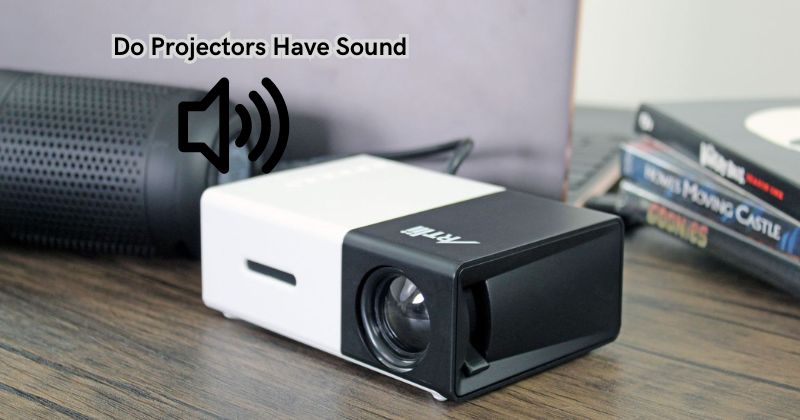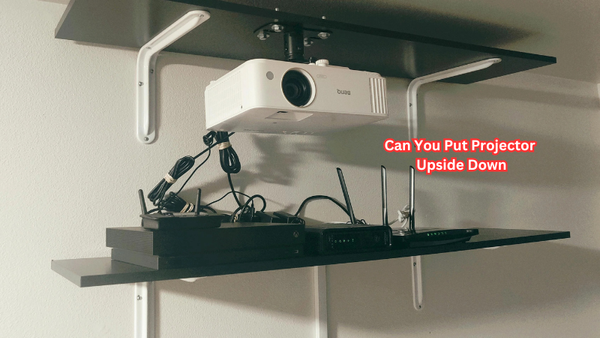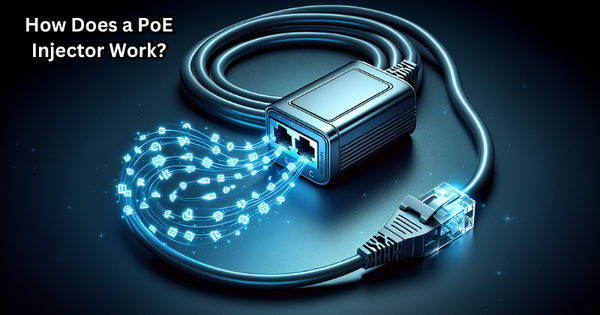The realm of home entertainment has significantly evolved, with projectors becoming a popular choice for those seeking to recreate the magic of cinema within the comfort of their homes.
A common question among potential buyers and enthusiasts is whether projectors come equipped with built-in sound capabilities. This inquiry is crucial, as sound is integral to the immersive experience of watching films, presentations, or gaming.
Understanding the audio features of projectors is essential for users looking to make informed decisions about their home entertainment setups. In this discussion, we delve into the auditory aspects of projectors, shedding light on their capabilities to deliver sound alongside visual content.
The Importance of Sound Quality
The debate between sound quality and visual quality has been raging for decades, and while both are crucial components of a home theater setup, many argue that sound plays a more significant role in the overall experience.
Sound brings images to life by providing depth, emotion, and impact to on-screen action. It adds dimension to scenes and creates an atmosphere that immerses viewers in the content.
Moreover, poor sound quality can be distracting and take away from the viewing experience. It is crucial to have a balanced and clear audio output to fully appreciate the visual elements of any media.
Do Projectors Have Sound?
The short answer is yes; projectors do have sound capabilities. However, the quality and loudness of the built-in speakers vary significantly among projector models.
Most projectors come with basic mono or stereo speakers that provide enough volume for small rooms or quiet environments. These built-in speakers are usually sufficient for presentations or casual viewing but may not be ideal for a full cinematic experience.
Some higher-end projectors come equipped with advanced sound technology, such as Dolby Atmos or DTS:X, which can provide a more immersive audio experience. However, these projectors are generally more expensive and may require additional speakers or a sound system for optimal performance.
Built-in Projector Speakers
The majority of modern projectors come equipped with built-in speakers, allowing users to enjoy audio without the need for additional external sound systems. These speakers are usually small in size and produce decent sound quality. However, they are not designed to replace dedicated home theater speakers or soundbars. Projector speakers are typically best suited for casual viewing or presentations.
The built-in speakers of projectors serve as a convenient option for users who do not want to invest in separate audio systems or are limited by space. They are also suitable for casual use and presentations where high-quality sound is not the main focus.
It is worth noting that the audio capabilities of projectors vary among different models and brands. Some may have more powerful built-in speakers, while others may have lower-quality ones. It is essential to consider the sound specifications of a projector before making a purchase, especially if audio quality is crucial for your viewing experience.
Integrated speakers usually come with specifications such as wattage, frequency response, and sound modes, which can help determine their capabilities. The projector supports Bluetooth audio transmission in addition to traditional wired connections.
The Case for External Sound Solutions
While projectors with built-in speakers can provide sufficient sound for basic viewing, external audio solutions offer a more immersive and high-quality experience. Dedicated home theater speakers or soundbars are designed to enhance the audio output of projectors and create a cinematic feel.
External speakers also have the advantage of being placed strategically around the room, creating surround sound that adds depth and realism to on-screen action. They also have a wider frequency range and higher power output, resulting in clearer dialogue, more impactful bass, and overall better sound quality.
Bluetooth speakers are another popular choice for projector audio. These wireless speakers can easily connect to projectors, eliminating the need for cumbersome cables and allowing for a more seamless setup.
Reasons Why Consider External Speakers or Soundbars Despite the Presence of Built-in Speakers
There are several reasons why investing in external speakers or a soundbar may be necessary, even if your projector has built-in sound capabilities:
- Ultimate Sound Quality: As mentioned earlier, dedicated speakers or soundbars provide superior audio quality compared to built-in speakers. If you want the best possible sound for your home theater setup, external solutions are the way to go.
- Customization: External speakers allow users to adjust the sound settings according to their preferences. This level of customization is not available with built-in speakers, which have limited equalizer options.
- Versatility: Many external audio solutions can be used with different devices, such as TVs and gaming consoles, providing a more versatile home entertainment experience.
- Compatibility: Some projectors may not have built-in sound capabilities, making external audio solutions a necessity for a complete viewing experience.
These are just some of the reasons why investing in external sound solutions may be beneficial, even if your projector has built-in speakers. Projector screen speakers are a personal choice, and ultimately, it depends on your needs and preferences.
Connectivity and Setup
When it comes to connecting external sound systems to your projector, most modern projectors have multiple audio output options such as HDMI, optical, or RCA. These connections allow users to connect their speakers or soundbar directly to the projector without requiring additional devices. HDMI cable is the preferred option for most, as it not only transmits audio but also high-quality video. Connect external speakers to projectors is usually straightforward, with most systems coming with instructions for easy setup. Audio and video settings may need to be adjusted in the projector's menu for optimal performance.
When using external audio systems using a 3.5mm stereo audio jack or RCA cables, it is essential to ensure that the volume on both the projector and external speakers is balanced for optimal audio output.
However, some older projectors may require a separate audio receiver for external speakers. It is crucial to check the connectivity options of your projector before purchasing external sound solutions. Moreover, proper placement and calibration of external speakers are essential for an optimal viewing experience.
Portable Projectors and Sound Quality
For users of portable projectors, sound quality may be a concern as they are often used in different environments and may not always have access to external audio solutions. In such cases, built-in speakers come in handy and can provide decent audio for casual use or presentations.
However, some portable projectors also come with the option to connect external speakers via Bluetooth or AUX cable. This allows users to enjoy better sound quality when using the projector at home or in a suitable environment. Moreover, portable projectors can also be paired with Bluetooth speakers for a more convenient and wireless setup.
Tips for Achieving Optimal Sound Quality
- When using external speakers, adjust the audio settings on your projector to output sound only through the external source.
- Place external speakers at different heights and angles for a more immersive surround sound experience.
- Experiment with different sound modes and equalizer settings to find the best audio output for your environment and preferences.
- Consider investing in a soundbar with a built-in subwoofer for enhanced bass and a more cinematic experience.
- When using Bluetooth speakers, ensure that they are fully charged or connected to a power source to avoid sudden sound disruptions during use.
By considering these tips, users can achieve the best possible sound quality when using external audio solutions with their projectors.
FAQs
Do projectors have volume?
Yes, most projectors have built-in volume control for their speakers. However, the loudness and quality of built-in speakers may vary depending on the projector model. External sound solutions can provide better sound quality and volume compared to built-in speakers.
Can I connect external speakers to any projector?
It depends on the connectivity options available on your projector. Most modern projectors have multiple audio output options, but it is essential to check the specifications of your projector before purchasing external sound systems.
Why is there no sound on my projector?
This could be due to several reasons, such as incorrect audio settings, faulty cables, or a malfunctioning speaker. It is essential to check all connections and ensure that the audio output is set correctly on your projector. If the issue persists, it may be necessary to seek technical assistance.
Do portable projectors have built-in speakers?
Most portable projectors do come with built-in speakers, but the loudness and quality may not be as robust as dedicated home theater projectors. Some portable projectors also come with the option to connect external speakers for a better audio experience.
Conclusion
In conclusion, while modern projectors are indeed equipped with built-in speakers, the quality and power of these integrated audio components can vary significantly. For casual viewing in small spaces, the convenience of built-in speakers may suffice.
However, external sound systems or soundbars become essential for those seeking a more immersive audio experience akin to a home cinema. Integrating external audio solutions offers a customizable sound experience that can greatly enhance the viewing pleasure. Understanding the limitations and potential of your projector's audio capabilities is key to tailoring your setup to meet your specific needs.
Whether through built-in speakers or external audio enhancements, achieving the perfect balance between visual and auditory elements is crucial for the ultimate entertainment experience.





